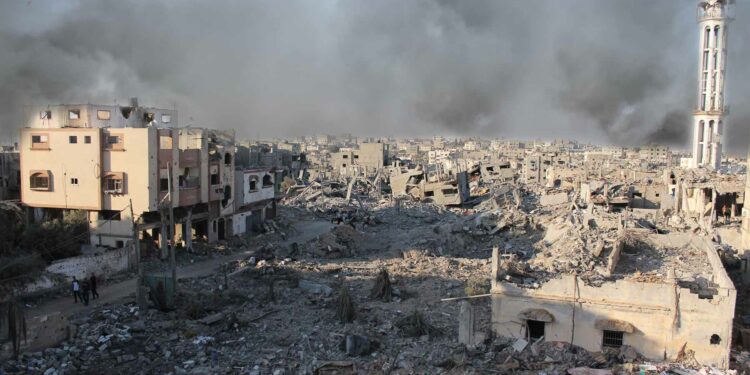As host of the The 7th Summit of Heads of State and Government of the Member Countries of the Gas Exporting Countries Forum (GECF), held this past March, Algerian President Abdelmadjid Tebboune offered a specially warm welcome to his guests from the Maghreb: Tunisian President Kais Saied and Mohammed al-Menfi, chairman of Libya’s Presidential Council and Mauritania President M. Mohammed Ould Ghazouani.
During the summit it was announced that the three leaders would begin holding periodic, tripartite meetings to “coordinate partnership and cooperation frameworks.” The stated objective is commendable. And yet, from the outset, the initiative has prompted a whirlwind of competing interpretations and speculations. Why? The answer is simple: the tripartite meetings do not include Morocco.
The first of these meetings took place in Tunis, on April 22. Media coverage was overblown, with some commentators dubbing the initiative a failure even before the leaders involved had a chance to spell out their ideas. Others slammed the talks as a betrayal of the Arab Maghreb Union (AMU). But the goal here isn’t to create a new regional union. Nor is it to bury the AMU, which is admittedly dormant but still exists.
Divisions over Western Sahara a hindrance to unity
The AMU is at a standstill because the Maghreb’s two heavyweights — Algeria and Morocco — are at serious odds over Western Sahara. Morocco’s move to normalize relations with Israel has further exacerbated those differences, and nullified any attempts at mediation and reconciliation between the two neighbors. Algeria considered Morocco’s presence in Western Sahara a threat even beforehand. Normalization, and the prospect that Israel could invest in Morocco militarily, adds to the anxiety, and marks a turning point for Algiers in its relationship with Rabat.
It’s little wonder, given the various diplomatic and security problems in North Africa, that Maghreb leaders would seek a new paradigm to address the challenges they face. But without a proper forum for dialogue, the region’s political regimes tend to react in a fragmented manner, seeking unilateral solutions that have little chance of success and leave the countries more vulnerable still. Strengthened by its close ties with Israel, Morocco is even less inclined now to seek a common approach. Algeria, for its part, is directly exposed to threats from the Sahel and from Libya, which has been particularly unstable since the fall of Colonel Gaddafi and the failure of the transitional process.
Libya is incapable militarily of countering outside interference in its internal affairs. It is paying particular attention to events in Chad, its southern neighbor, which has attracted increasing interest from France, following the latter’s withdrawal from Mali and Niger, and from Russia and some Gulf monarchies.
Different approaches to the crisis in the Sahel
For Algiers, the situation is all the more concerning given that it coincides with coups in Niger and Mali that brought in a new military elite that is distrustful of Algeria. Mali’s opposition to the Algiers Accords is a major foreign policy challenge for Algeria, and comes at a time when the withdrawal of French forces from Mali and Niger has heightened European and American concerns about the evolution of terrorist organizations.
Spared from those threats in the Sahel, Morocco is taking a very different approach, boosting ties with Sahelian countries by offering them access to the Atlantic Ocean. Late last year, in a meeting in Marrakech attended by the foreign ministers of Mali, Niger, Burkina Faso, and Chad, Rabat launched its “Atlantic Strategy for Sahel Countries.” It is an ambitious initiative, but also limited given that Morocco itself isn’t geographically connected to the countries in question. What’s more, the talks didn’t involve Mauritania, Senegal and Guinea-Conakry.
Algeria has its reasons, in other words, for reaching out right now to its Tunisian, Libyan and Mauritanian neighbors and seeking new channels of cooperation, especially with Tunisia and Libya. Is this an attempt to replace the AMU? No. Algeria knows that conditions for such a project are not in place. But it also sees Morocco making diplomatic advances on the African continent, and knows that its own engagement with the region declined during the long tenure of former President Abdelaziz Bouteflika (1999-2019). Mauritania, for its part, is taking more of a wait and see approach to the still ambiguous Algerian initiative — on board, but without fully committing.
For Algeria, the goal is to create a new platform to discuss shared security and foreign policy issues. The format is reminiscent of the 5+5 Forum, an informal grouping of European and North African defense and security ministers also known as the Western Mediterranean Forum. And it was with that model in mind that the inaugural Maghreb tripartite summit, held April 22 in Tunis and attended by Tebboune, Saied and Menfi, resulted in a joint declaration.
The battle for influence between Algeria and Morocco
The document emphasizes increased coordination in security matters, border protection and irregular migration, particularly from African countries to Europe. The three heads of state also commit to strengthening economic cooperation and bilateral investments and, even more importantly, insist on the need for a political resolution to the crisis in Libya. The European Union will need to be involved, of course, but what Algeria wants is for the three countries present in Tunis to speak with a unified voice. Algiers also wants to showcase itself as an indispensable actor in dealings with the Europeans.
This is the Maghreb moving forward despite the competition between Algiers and Rabat. The AMUis dead in all but name. Algiers has legitimate concerns about its national security, particularly with regards to Libya and the Sahel. It seeks a position of strength in negotiations with the Europeans, and knows that three Maghreb states speaking together have a better chance of being heard and respected. In contrast, Morocco, shielded from the turmoil in the Sahel, wants to expand its influence in Africa in support of its primary interest: Western Sahara.
This battle for influence between Algeria and Morocco does the region no favors and is ultimately detrimental to the two Maghreb heavyweights themselves. But again, the summit in Tunis shouldn’t be seen as an effort to sabotage the UMA. It is evidence, rather, that as long as Morocco and Algeria remain at odds, there will be an increasing multiplicity of diplomatic initiatives.
The situation isn’t ideal, but it’s better to have various overlapping diplomatic initiatives than a dynamic of conflict. The Tripartite meeting in Tunis shows that there is a lack of space in the Maghreb dedicated to dialogue and consultation. This is a problem, and it’s high time that the people of the region take note and demand a shift back toward the principles that our forefathers, in their fight for Maghreb independence and unity, laid out during the Tangiers Conference of 1958. It won’t be easy, but together we can move forward, working on what brings us together and leaving aside what drives us apart.
Hasni Abdi is the director of the Study and Research Center for the Arab and Mediterranean World (CERMAM).





